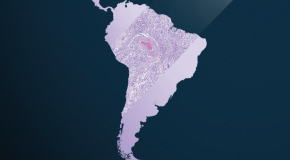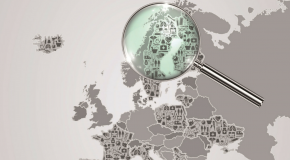Healthcare perspectives from The Economist Intelligence Unit
The road to a better normal: Breast Cancer patients and survivors in the EU workforce
The road to a better normal: Breast cancer patients and survivors in the EU workforce is an Economist Intelligence Unit report, sponsored by Pfizer. It investigates the challenges involved in the return to employment for a growing number of breast cancer patients and survivors of working age. In particular, it examines the growing number of women in this situation who wish to work, the barriers to doing so, and how key stakeholders could help.
More from this series

white paper
The road to a better normal: Breast Cancer patients and survivors in the EU...
Healthcare systems in Europe have slowly transformed breast cancer from a fatal condition into a (frequently chronic)

infographic
The road to a better normal: Breast Cancer patients and survivors in the EU...

case study
The road to a better normal: Country case study profiles
Related content

Value-based healthcare in Sweden: Reaching the next level
The need to get better value from healthcare investment has never been more important as ageing populations and increasing numbers of people with multiple chronic conditions force governments to make limited financial resources go further.
These pressures, along with a greater focus on patient-centred care, have raised the profile of VBHC, especially in European healthcare systems. Sweden, with its highly comprehensive and egalitarian healthcare system, has been a leader in implementing VBHC from the beginning, a fact that was underscored in a 2016 global assessment of VBHC published by The Economist Intelligence Unit.
This paper looks at the ways in which Sweden has implemented VBHC, the areas in which it has faced obstacles and the lessons that it can teach other countries and health systems looking to improve the value of their own healthcare investments.

Breast cancer patients and survivors in the Asia-Pacific workforce
With more older women also working, how will the rising trend of breast cancer survivorship manifest in workplace policies, practices and culture? What challenges do breast cancer survivors face when trying to reintegrate into the workforce, or to continue working during treatment? How can governments, companies and society at large play a constructive role?
This series of reports looks at the situation for breast cancer survivors in Australia, New Zealand and South Korea. It finds that while progress has been made, more needs to be done, particularly in South Korea, where public stigma around cancer remains high.
The Cost of Silence
Cardiovascular diseases levy a substantial financial toll on individuals, their households and the public finances. These include the costs of hospital treatment, long-term disease management and recurring incidence of heart attacks and stroke. They also include the costs of functional impairment and knock-on costs as families may lose breadwinners or have to withdraw other family members from the workforce to care for a CVD patient. Governments also lose tax revenue due to early retirement and mortality, and can be forced to reallocate public finances from other budgets to maintain an accessible healthcare system in the face of rising costs.
As such, there is a need for more awareness of the ways in which people should actively work to reduce their CVD risk. There is also a need for more primary and secondary preventative support from health agencies, policymakers and nongovernmental groups.
To inform the decisions and strategies of these stakeholders, The Economist Intelligence Unit and EIU Healthcare, its healthcare subsidiary, have conducted a study of the prevalence and costs of the top four modifiable risk factors that contribute to CVDs across the Asian markets of China, Australia, Hong Kong, Japan, Singapore, South Korea, Taiwan and Thailand.
Download the report to learn more.
Preventing Stroke: Uneven Progress
The burden of stroke on countries, communities and individuals is well-documented, with stroke survivors being troubled by a greater range of disabilities than those with any other condition. Fortunately, the risk factors for stroke are relatively well-understood by medical professionals, and opportunities have been identified to implement effective prevention and management strategies. However, these best practices are not consistently implemented around the world.
Related content

Value-based healthcare in Sweden: Reaching the next level
The need to get better value from healthcare investment has never been more important as ageing populations and increasing numbers of people with multiple chronic conditions force governments to make limited financial resources go further.
These pressures, along with a greater focus on patient-centred care, have raised the profile of VBHC, especially in European healthcare systems. Sweden, with its highly comprehensive and egalitarian healthcare system, has been a leader in implementing VBHC from the beginning, a fact that was underscored in a 2016 global assessment of VBHC published by The Economist Intelligence Unit.
This paper looks at the ways in which Sweden has implemented VBHC, the areas in which it has faced obstacles and the lessons that it can teach other countries and health systems looking to improve the value of their own healthcare investments.

Breast cancer patients and survivors in the Asia-Pacific workforce
With more older women also working, how will the rising trend of breast cancer survivorship manifest in workplace policies, practices and culture? What challenges do breast cancer survivors face when trying to reintegrate into the workforce, or to continue working during treatment? How can governments, companies and society at large play a constructive role?
This series of reports looks at the situation for breast cancer survivors in Australia, New Zealand and South Korea. It finds that while progress has been made, more needs to be done, particularly in South Korea, where public stigma around cancer remains high.
The Cost of Silence
Cardiovascular diseases levy a substantial financial toll on individuals, their households and the public finances. These include the costs of hospital treatment, long-term disease management and recurring incidence of heart attacks and stroke. They also include the costs of functional impairment and knock-on costs as families may lose breadwinners or have to withdraw other family members from the workforce to care for a CVD patient. Governments also lose tax revenue due to early retirement and mortality, and can be forced to reallocate public finances from other budgets to maintain an accessible healthcare system in the face of rising costs.
As such, there is a need for more awareness of the ways in which people should actively work to reduce their CVD risk. There is also a need for more primary and secondary preventative support from health agencies, policymakers and nongovernmental groups.
To inform the decisions and strategies of these stakeholders, The Economist Intelligence Unit and EIU Healthcare, its healthcare subsidiary, have conducted a study of the prevalence and costs of the top four modifiable risk factors that contribute to CVDs across the Asian markets of China, Australia, Hong Kong, Japan, Singapore, South Korea, Taiwan and Thailand.
Download the report to learn more.
Related content

Value-based healthcare in Sweden: Reaching the next level
The need to get better value from healthcare investment has never been more important as ageing populations and increasing numbers of people with multiple chronic conditions force governments to make limited financial resources go further.
These pressures, along with a greater focus on patient-centred care, have raised the profile of VBHC, especially in European healthcare systems. Sweden, with its highly comprehensive and egalitarian healthcare system, has been a leader in implementing VBHC from the beginning, a fact that was underscored in a 2016 global assessment of VBHC published by The Economist Intelligence Unit.
This paper looks at the ways in which Sweden has implemented VBHC, the areas in which it has faced obstacles and the lessons that it can teach other countries and health systems looking to improve the value of their own healthcare investments.

Breast cancer patients and survivors in the Asia-Pacific workforce
With more older women also working, how will the rising trend of breast cancer survivorship manifest in workplace policies, practices and culture? What challenges do breast cancer survivors face when trying to reintegrate into the workforce, or to continue working during treatment? How can governments, companies and society at large play a constructive role?
This series of reports looks at the situation for breast cancer survivors in Australia, New Zealand and South Korea. It finds that while progress has been made, more needs to be done, particularly in South Korea, where public stigma around cancer remains high.
The Cost of Silence
Cardiovascular diseases levy a substantial financial toll on individuals, their households and the public finances. These include the costs of hospital treatment, long-term disease management and recurring incidence of heart attacks and stroke. They also include the costs of functional impairment and knock-on costs as families may lose breadwinners or have to withdraw other family members from the workforce to care for a CVD patient. Governments also lose tax revenue due to early retirement and mortality, and can be forced to reallocate public finances from other budgets to maintain an accessible healthcare system in the face of rising costs.
As such, there is a need for more awareness of the ways in which people should actively work to reduce their CVD risk. There is also a need for more primary and secondary preventative support from health agencies, policymakers and nongovernmental groups.
To inform the decisions and strategies of these stakeholders, The Economist Intelligence Unit and EIU Healthcare, its healthcare subsidiary, have conducted a study of the prevalence and costs of the top four modifiable risk factors that contribute to CVDs across the Asian markets of China, Australia, Hong Kong, Japan, Singapore, South Korea, Taiwan and Thailand.
Download the report to learn more.
Policy Approaches to Stroke Prevention
Preventing stroke: uneven progress is a report by The Economist Intelligence Unit (EIU), sponsored by The Bristol-Myers Squibb–Pfizer Alliance. It assesses policy efforts to reduce risks of stroke in 20 countries globally based on a scorecard rating each country’s performance across different aspects, including awareness, screening practices and policies among others.
More from this series
Related content

Value-based healthcare in Sweden: Reaching the next level
The need to get better value from healthcare investment has never been more important as ageing populations and increasing numbers of people with multiple chronic conditions force governments to make limited financial resources go further.
These pressures, along with a greater focus on patient-centred care, have raised the profile of VBHC, especially in European healthcare systems. Sweden, with its highly comprehensive and egalitarian healthcare system, has been a leader in implementing VBHC from the beginning, a fact that was underscored in a 2016 global assessment of VBHC published by The Economist Intelligence Unit.
This paper looks at the ways in which Sweden has implemented VBHC, the areas in which it has faced obstacles and the lessons that it can teach other countries and health systems looking to improve the value of their own healthcare investments.

Breast cancer patients and survivors in the Asia-Pacific workforce
With more older women also working, how will the rising trend of breast cancer survivorship manifest in workplace policies, practices and culture? What challenges do breast cancer survivors face when trying to reintegrate into the workforce, or to continue working during treatment? How can governments, companies and society at large play a constructive role?
This series of reports looks at the situation for breast cancer survivors in Australia, New Zealand and South Korea. It finds that while progress has been made, more needs to be done, particularly in South Korea, where public stigma around cancer remains high.
The Cost of Silence
Cardiovascular diseases levy a substantial financial toll on individuals, their households and the public finances. These include the costs of hospital treatment, long-term disease management and recurring incidence of heart attacks and stroke. They also include the costs of functional impairment and knock-on costs as families may lose breadwinners or have to withdraw other family members from the workforce to care for a CVD patient. Governments also lose tax revenue due to early retirement and mortality, and can be forced to reallocate public finances from other budgets to maintain an accessible healthcare system in the face of rising costs.
As such, there is a need for more awareness of the ways in which people should actively work to reduce their CVD risk. There is also a need for more primary and secondary preventative support from health agencies, policymakers and nongovernmental groups.
To inform the decisions and strategies of these stakeholders, The Economist Intelligence Unit and EIU Healthcare, its healthcare subsidiary, have conducted a study of the prevalence and costs of the top four modifiable risk factors that contribute to CVDs across the Asian markets of China, Australia, Hong Kong, Japan, Singapore, South Korea, Taiwan and Thailand.
Download the report to learn more.
Inequality in access to care undermines cancer-control efforts in Latin America
Related content

Cancer control, access and inequality in Latin America: A tale of light and...
The Economist Intelligence Unit has created the Latin America Cancer Control Scorecard (LACCS) to assess cancer-control policies and programmes in 12 Latin American countries. The LACCS shows that a number of countries in the region have put in place or strengthened their National Cancer Control Plans. However, plans are often not sufficiently comprehensive and lack funding. Progress has also been made in rolling out population-based cancer registries in the region, but issues with data quality and coverage persist. Other areas with room for improvement include high rates of late-stage diagnosis, insufficient resources for current and future cancer-care needs, fragmented healthcare systems and inequalities in access to care.

Tackling the burden of prostate cancer in Latin America: The prospects for...
Prostate cancer is placing an ever-growing burden on already strained Latin American healthcare systems, as both the incidence of the disease and mortality rates rise. For the purposes of this report, Latin America encompasses the territory from the northern border of Mexico to the southern tip of South America, including the Caribbean.
Prostate cancer is the leading cause of male cancer-related deaths in the region, and the disease and economic burden is set to rise in tandem with longevity and changes in lifestyle and diet.
Addressing this rapid growth is thus an urgent task, and one that higher-income countries around the world have addressed with some success through patient-centred healthcare. In the US, for example, integrated-care systems have been delivered though accountable care organisations that focus on patient needs.
The World Health Organisation (WHO) says that "integrated people-centred health services means putting the needs of people and communities, not diseases, at the centre of health systems, and empowering people to take charge of their own health".[i] However, integrated and patient-centred healthcare has seen a slow rate of adoption in the Latin America region. This suggests that much work needs to be done to sharpen the focus on respecting and responding to patient needs.
This report draws on findings from an Economist Intelligence Unit study, Assessing the burden of Prostate Cancer in Brazil,[ii] and in-depth interviews with ten experts on cancer care in the region. It assesses current prostate-cancer developments and provides real-world examples from Brazil, Colombia, Costa Rica and Mexico of how institutions are addressing, or failing to address, prostate cancer through a patient-centred approach.
Learn more by downloading our 'Assessing the burden of Prostate Cancer in Brazil' report below.
[i] WHO, WHO Framework on integrated people-centred health services. Available at: http://www.who.int/servicedeliverysafety/areas/people-centred-care/en/
[ii] The Economist Intelligence Unit, Assessing the burden of Prostate Cancer in Brazil, October 2016.

Breast cancer in Asia
The regional rise in age-standardised incidence has been running at four to eight times the global average since the 1990s. Meanwhile, the disease is no longer a concern large of developed countries but has become an increasingly important one in many emerging market states, where it is frequently now the most common form of cancer among females.
This report, Breast Cancer: The challenge and response, written by The Economist Intelligence Unit (EIU) and commissioned by Pfizer, examines the growing health burden of the disease in 10 major Asia-Pacific countries and territories, as well as how health systems are addressing the challenge.
Click here to view: Report | InfographicRelated content

Value-based healthcare in Sweden: Reaching the next level
The need to get better value from healthcare investment has never been more important as ageing populations and increasing numbers of people with multiple chronic conditions force governments to make limited financial resources go further.
These pressures, along with a greater focus on patient-centred care, have raised the profile of VBHC, especially in European healthcare systems. Sweden, with its highly comprehensive and egalitarian healthcare system, has been a leader in implementing VBHC from the beginning, a fact that was underscored in a 2016 global assessment of VBHC published by The Economist Intelligence Unit.
This paper looks at the ways in which Sweden has implemented VBHC, the areas in which it has faced obstacles and the lessons that it can teach other countries and health systems looking to improve the value of their own healthcare investments.

Breast cancer patients and survivors in the Asia-Pacific workforce
With more older women also working, how will the rising trend of breast cancer survivorship manifest in workplace policies, practices and culture? What challenges do breast cancer survivors face when trying to reintegrate into the workforce, or to continue working during treatment? How can governments, companies and society at large play a constructive role?
This series of reports looks at the situation for breast cancer survivors in Australia, New Zealand and South Korea. It finds that while progress has been made, more needs to be done, particularly in South Korea, where public stigma around cancer remains high.
The Cost of Silence
Cardiovascular diseases levy a substantial financial toll on individuals, their households and the public finances. These include the costs of hospital treatment, long-term disease management and recurring incidence of heart attacks and stroke. They also include the costs of functional impairment and knock-on costs as families may lose breadwinners or have to withdraw other family members from the workforce to care for a CVD patient. Governments also lose tax revenue due to early retirement and mortality, and can be forced to reallocate public finances from other budgets to maintain an accessible healthcare system in the face of rising costs.
As such, there is a need for more awareness of the ways in which people should actively work to reduce their CVD risk. There is also a need for more primary and secondary preventative support from health agencies, policymakers and nongovernmental groups.
To inform the decisions and strategies of these stakeholders, The Economist Intelligence Unit and EIU Healthcare, its healthcare subsidiary, have conducted a study of the prevalence and costs of the top four modifiable risk factors that contribute to CVDs across the Asian markets of China, Australia, Hong Kong, Japan, Singapore, South Korea, Taiwan and Thailand.
Download the report to learn more.
Living with HIV: Challenges in Spain's HIV management
HIV management, has been written by The Economist Intelligence Unit (EIU) and is sponsored by Gilead Sciences. It is informed by the insights of a panel of experts on HIV in Spain and five in-depth interviews. The report’s aims: to assess the current knowledge and understanding of HIV/AIDS, of late diagnosis, of ageing and comorbidities in Spain and to identify any current gaps in the provision of healthcare services to patients in Spain.
Related content

Value-based healthcare in Sweden: Reaching the next level
The need to get better value from healthcare investment has never been more important as ageing populations and increasing numbers of people with multiple chronic conditions force governments to make limited financial resources go further.
These pressures, along with a greater focus on patient-centred care, have raised the profile of VBHC, especially in European healthcare systems. Sweden, with its highly comprehensive and egalitarian healthcare system, has been a leader in implementing VBHC from the beginning, a fact that was underscored in a 2016 global assessment of VBHC published by The Economist Intelligence Unit.
This paper looks at the ways in which Sweden has implemented VBHC, the areas in which it has faced obstacles and the lessons that it can teach other countries and health systems looking to improve the value of their own healthcare investments.

Breast cancer patients and survivors in the Asia-Pacific workforce
With more older women also working, how will the rising trend of breast cancer survivorship manifest in workplace policies, practices and culture? What challenges do breast cancer survivors face when trying to reintegrate into the workforce, or to continue working during treatment? How can governments, companies and society at large play a constructive role?
This series of reports looks at the situation for breast cancer survivors in Australia, New Zealand and South Korea. It finds that while progress has been made, more needs to be done, particularly in South Korea, where public stigma around cancer remains high.
The Cost of Silence
Cardiovascular diseases levy a substantial financial toll on individuals, their households and the public finances. These include the costs of hospital treatment, long-term disease management and recurring incidence of heart attacks and stroke. They also include the costs of functional impairment and knock-on costs as families may lose breadwinners or have to withdraw other family members from the workforce to care for a CVD patient. Governments also lose tax revenue due to early retirement and mortality, and can be forced to reallocate public finances from other budgets to maintain an accessible healthcare system in the face of rising costs.
As such, there is a need for more awareness of the ways in which people should actively work to reduce their CVD risk. There is also a need for more primary and secondary preventative support from health agencies, policymakers and nongovernmental groups.
To inform the decisions and strategies of these stakeholders, The Economist Intelligence Unit and EIU Healthcare, its healthcare subsidiary, have conducted a study of the prevalence and costs of the top four modifiable risk factors that contribute to CVDs across the Asian markets of China, Australia, Hong Kong, Japan, Singapore, South Korea, Taiwan and Thailand.
Download the report to learn more.
Living with HIV: Challenges in Spain's HIV management
However, for the first time, nearly half of HIV-infected people on Spain are over the age of 50; they are facing special challenges resulting from the accumulated toxicities of earlier treatment and from social difficulties and exclusion—primarily affecting those infected in the earliest wave of the epidemic. Spain’s populations most at-risk of contracting HIV are also changing, but practices to encourage early detection and testing are not being adjusted in a timely manner.
More from this series

white paper
Living with HIV: Challenges in Spain's HIV management
HIV management, has been written by The Economist Intelligence Unit (EIU) and is sponsored by Gilead Sciences. It is

infographic
Living with HIV: Challenges in Spain's HIV management
Related content

Value-based healthcare in Sweden: Reaching the next level
The need to get better value from healthcare investment has never been more important as ageing populations and increasing numbers of people with multiple chronic conditions force governments to make limited financial resources go further.
These pressures, along with a greater focus on patient-centred care, have raised the profile of VBHC, especially in European healthcare systems. Sweden, with its highly comprehensive and egalitarian healthcare system, has been a leader in implementing VBHC from the beginning, a fact that was underscored in a 2016 global assessment of VBHC published by The Economist Intelligence Unit.
This paper looks at the ways in which Sweden has implemented VBHC, the areas in which it has faced obstacles and the lessons that it can teach other countries and health systems looking to improve the value of their own healthcare investments.

Breast cancer patients and survivors in the Asia-Pacific workforce
With more older women also working, how will the rising trend of breast cancer survivorship manifest in workplace policies, practices and culture? What challenges do breast cancer survivors face when trying to reintegrate into the workforce, or to continue working during treatment? How can governments, companies and society at large play a constructive role?
This series of reports looks at the situation for breast cancer survivors in Australia, New Zealand and South Korea. It finds that while progress has been made, more needs to be done, particularly in South Korea, where public stigma around cancer remains high.
The Cost of Silence
Cardiovascular diseases levy a substantial financial toll on individuals, their households and the public finances. These include the costs of hospital treatment, long-term disease management and recurring incidence of heart attacks and stroke. They also include the costs of functional impairment and knock-on costs as families may lose breadwinners or have to withdraw other family members from the workforce to care for a CVD patient. Governments also lose tax revenue due to early retirement and mortality, and can be forced to reallocate public finances from other budgets to maintain an accessible healthcare system in the face of rising costs.
As such, there is a need for more awareness of the ways in which people should actively work to reduce their CVD risk. There is also a need for more primary and secondary preventative support from health agencies, policymakers and nongovernmental groups.
To inform the decisions and strategies of these stakeholders, The Economist Intelligence Unit and EIU Healthcare, its healthcare subsidiary, have conducted a study of the prevalence and costs of the top four modifiable risk factors that contribute to CVDs across the Asian markets of China, Australia, Hong Kong, Japan, Singapore, South Korea, Taiwan and Thailand.
Download the report to learn more.
To infinity and beyond—three things international donors should consider as health economic evaluation goes global
Related content

Value-based healthcare in Sweden: Reaching the next level
The need to get better value from healthcare investment has never been more important as ageing populations and increasing numbers of people with multiple chronic conditions force governments to make limited financial resources go further.
These pressures, along with a greater focus on patient-centred care, have raised the profile of VBHC, especially in European healthcare systems. Sweden, with its highly comprehensive and egalitarian healthcare system, has been a leader in implementing VBHC from the beginning, a fact that was underscored in a 2016 global assessment of VBHC published by The Economist Intelligence Unit.
This paper looks at the ways in which Sweden has implemented VBHC, the areas in which it has faced obstacles and the lessons that it can teach other countries and health systems looking to improve the value of their own healthcare investments.

Breast cancer patients and survivors in the Asia-Pacific workforce
With more older women also working, how will the rising trend of breast cancer survivorship manifest in workplace policies, practices and culture? What challenges do breast cancer survivors face when trying to reintegrate into the workforce, or to continue working during treatment? How can governments, companies and society at large play a constructive role?
This series of reports looks at the situation for breast cancer survivors in Australia, New Zealand and South Korea. It finds that while progress has been made, more needs to be done, particularly in South Korea, where public stigma around cancer remains high.
The Cost of Silence
Cardiovascular diseases levy a substantial financial toll on individuals, their households and the public finances. These include the costs of hospital treatment, long-term disease management and recurring incidence of heart attacks and stroke. They also include the costs of functional impairment and knock-on costs as families may lose breadwinners or have to withdraw other family members from the workforce to care for a CVD patient. Governments also lose tax revenue due to early retirement and mortality, and can be forced to reallocate public finances from other budgets to maintain an accessible healthcare system in the face of rising costs.
As such, there is a need for more awareness of the ways in which people should actively work to reduce their CVD risk. There is also a need for more primary and secondary preventative support from health agencies, policymakers and nongovernmental groups.
To inform the decisions and strategies of these stakeholders, The Economist Intelligence Unit and EIU Healthcare, its healthcare subsidiary, have conducted a study of the prevalence and costs of the top four modifiable risk factors that contribute to CVDs across the Asian markets of China, Australia, Hong Kong, Japan, Singapore, South Korea, Taiwan and Thailand.
Download the report to learn more.
New EIU index highlights need for political and financial commitment to improving access to healthcare
Related content

Value-based healthcare in Europe: Laying the foundation
Value-based healthcare looks at health outcomes of treatment relative to cost. In this particular report The EIU examines the way in which value is interpreted across the continent, the extent to which European countries are adopting cost-effectiveness as a key criterion for assessing it, and the efforts to develop new models for pricing innovation.
Further reading:
An introduction to value-based healthcare in Europe Value-based Health Assessment in Italy: A decentralised model Value-based healthcare in Germany: From free price-setting to a regulated market Value-based healthcare in Spain: Regional experimentation in a shared governance setting Value-based healthcare in France: A slow adoption of cost-effectiveness criteria Value-based healthcare in Portugal: Necessity is the mother of invention Value-based healthcare in the UK: A system of trial and error
Value-based healthcare in Japan
Value-based healthcare looks at health outcomes of treatment relative to cost. In this particular report The EIU examines whether Japan's healthcare system delivers good value for money, its approach to pricing and reimbursement, and the evolution of a nascent system for health technology assessment (HTA).
Further reading:
An introduction to value-based healthcare in Europe Value-based Health Assessment in Italy: A decentralised model Value-based healthcare in Germany: From free price-setting to a regulated market Value-based healthcare in Spain: Regional experimentation in a shared governance setting Value-based healthcare in France: A slow adoption of cost-effectiveness criteria Value-based healthcare in Portugal: Necessity is the mother of invention Value-based healthcare in the UK: A system of trial and error Value-based healthcare in Europe: Laying the foundation
Value-based healthcare in the UK: A system of trial and error
Value-based healthcare looks at health outcomes of treatment relative to cost. In this particular report The EIU examines the structure of UK healthcare delivery, the unique model used by its health technology assessment (HTA) agencies, and its history of experimentation in value-based pricing.
Further reading:
An introduction to value-based healthcare in Europe Value-based Health Assessment in Italy: A decentralised model Value-based healthcare in Germany: From free price-setting to a regulated market Value-based healthcare in Spain: Regional experimentation in a shared governance setting Value-based healthcare in France: A slow adoption of cost-effectiveness criteria Value-based healthcare in Portugal: Necessity is the mother of invention Value-based healthcare in Europe: Laying the foundation

